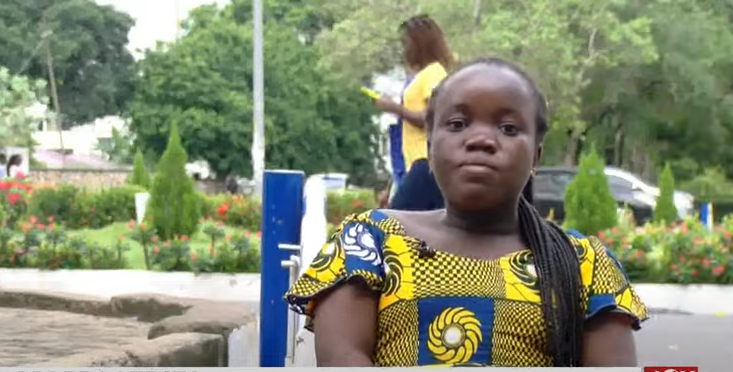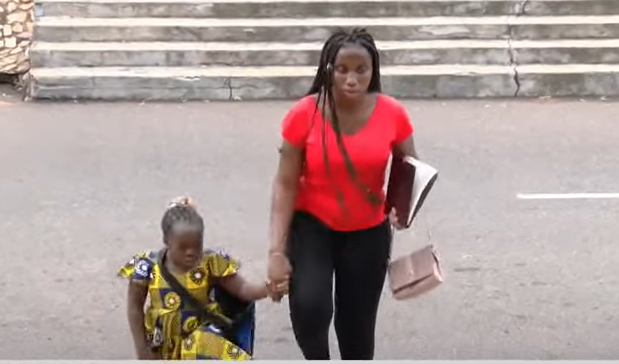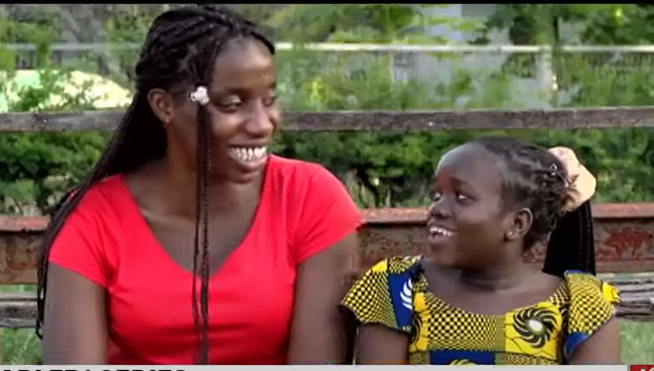Felicity Wedava Ajure, a 21-year-old first-year student of the University of Ghana.
Usually repairs her bicycle by herself to safe cost and reduce the inconvenience associated with visiting the repair shops. Her bicycle is more than just a mode of transportation; it symbolises her independence and her commitment to helping others living with disabilities.
Although she suffers with a disability called achondroplasia, Felicity believes she is unique and special in many ways.

Felicity moves her hands with dexterity as she applies a cold patch to her bicycle tyre, a skill she learned in order to save money and avoid the hassle of repair shops.
Her bicycle is a lifeline, not just for herself but for her friend, Esther Boadu, who is visually impaired.
“I normally fix it by using a cold patch and solution because my mum and dad always advise me to learn how to use those things to repair my bike instead of sending it to the market for repairs. Sending it to the market for repairs is always a difficult task, and they have to spend a huge amount of money.
“So I repair it myself rather than send it to the market for repairs. It is a way and means of saving money. I will use it for other purposes instead of using it to repair my bike when I have the items for repair,” she said.
Felicity and Esther’s friendship began one Monday morning during a lecture. It was not until after the lecture that Felicity discovered Esther’s visual impairment.

It begun when Esther asked Felicity to assist her get around.
Felicity recounts when Esther sought help “I asked her, ‘How can this be because I know you can actually see? Why are you pretending not to see?’ She was like she’s visually impaired and can’t see, so I decided to help her.”
And so began a friendship. Every day, Felicity and Esther navigate the sprawling campus together.
As Felicity rides, Esther holds her shoulder, guiding her friend to their lecture halls.
They admit that the typology of the campus was not very favourable since they have to climb several stairs before getting to their lecture halls, sometimes jump over gutters but since they were friends they often helped each other navigate the premises
Their bond extends beyond the classroom. They study, cook and share laughter during their leisure times.
Felicity’s heart is filled with compassion, not just for Esther, but for others living with various forms of disability. She finds joy in assisting her friends, despite the challenges they face.
“Other people see their visual impairment as contagious. They think that by coming into contact with them, they will be infected, so I decided to be friends with her to give her a helping hand,” she said.
Their friendship is reciprocal. Esther helps Felicity with tasks like washing dishes and provides academic support, explaining difficult concepts during their study sessions.
The two friends appear to be inseparable. Whether it is attending lectures, cooking, or simply enjoying each other’s company, their bond is unbreakable.

Felicity said “Whenever I feel sad, she normally entertains me, and I do the same for her.”
Esther, also, cherishes their friendship, finding strength and comfort in their daily interactions.
“It has been fantastic…I really like our friendship,” she said.
Their shared moments of joy and mutual support paint a beautiful picture of what friendship truly means.
Felicity dreams of becoming a journalist, using her voice to advocate for others with disabilities.
“I want to be a journalist. I’ve never seen people like me giving news before. I want to use the power of the microphone to advocate for people living with disabilities,” she said.
Esther is however hopeful that the world would come to know friendship is possible even for people with disability.
“We want the whole world to know of our friendship, a visually impaired and a person living with achondroplasia being besties,” she said.

Despite the challenges, Felicity and Esther are determined to succeed in their academic pursuit and hope their friendship will inspire others as well as highlight the need for better support for students with disabilities.
Source: Myjoyonline
